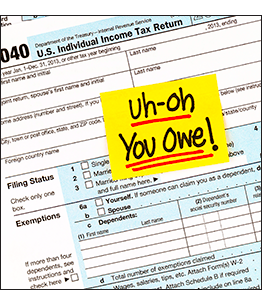Common IRS Surprises
 No one likes surprises from the IRS, but they do occasionally happen. Here are some examples of unpleasant tax situations you could find yourself in and what to do about them.
No one likes surprises from the IRS, but they do occasionally happen. Here are some examples of unpleasant tax situations you could find yourself in and what to do about them.
- An expected refund turns into a tax payment. Nothing may be more deflating than expecting to get a nice tax refund and instead being met with the reality that you actually owe the IRS more money.
What you can do: Run an estimated tax return and see if you may be in for a surprise. If so, adjust how much federal income tax is withheld from your paycheck for the balance of the year. Consult with your company’s human resources department to figure out how to make the necessary adjustments for the future. If you’re self-employed, examine if you need to increase your estimated tax payments due in January, April, June and September.
- Getting a letter from the IRS. Official tax forms such as W-2s and 1099s are mailed to both you and the IRS. If the figures on your income tax return do not match those in the hands of the IRS, you will get a letter from the IRS saying that you’re being audited. These audits are now done by mail and are commonly known as correspondence audits. The IRS assumes their figures are correct and will demand payment for the taxes you owe on the amount of income you omitted on your tax return.
What you can do: Assuming you already know you received all your 1099s and W-2s and confirmed their accuracy, verify the information in the IRS letter with your records. Believe it or not, the IRS sometimes makes mistakes! It is always best to ask for help in how to correspond and make your payments in a timely fashion, if they are justified.
- Getting a tax bill for an emergency retirement distribution. Due to the pandemic, you can withdraw money from retirement accounts in 2020 without getting a 10% early withdrawal penalty, but you’ll still have to pay income taxes on the amount withdrawn. If you don’t plan for this extra tax you will be surprised with an additional tax bill. And you may still get an underpayment penalty bill from the IRS because you did not withhold enough during the year. You may also still receive an early withdrawal penalty in error because the IRS is still scrambling to update their systems with all of this year’s tax relief changes.
What you can do: Set aside a percentage of your distribution for taxes. Your account administrator may withhold funds automatically for you when you request the withdrawal, so check your statements. Your review should be for both federal and any state tax obligations. If the withholding is not sufficient, consider sending in an estimated tax payment. And if you are charged a withdrawal penalty, ask for help to correspond with the IRS to get this charge reversed.
No one likes surprises when filing their taxes. With a little planning now, you can reduce the chance of having a surprise hit your tax return later.

